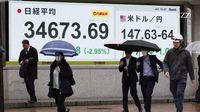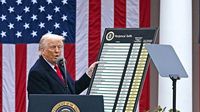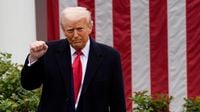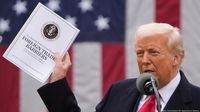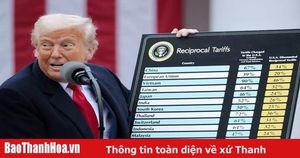US President Donald Trump has announced sweeping new tariffs on imports, significantly impacting global trading partners, including Switzerland, the European Union (EU), and China. The tariffs, which include a staggering 31 percent surcharge on Swiss imports, have sent shockwaves through international markets and raised concerns about potential retaliatory measures.
On April 2, 2025, Trump declared this day a "liberation day" for the US economy, accusing other nations of exploiting the United States through unfair trade practices. He stated that a minimum tariff of ten percent will come into effect on April 5, 2025, while higher tariffs targeting what the White House deems the "worst offenders" will take effect on April 9, 2025.
"This is a day that will go down in history as the day American industry was reborn," Trump proclaimed during a press conference at the White House. He emphasized that the tariffs are a necessary step to reclaim US economic sovereignty, stating, "For decades, our country has been plundered, ravaged, and raped by both friends and enemies alike. That is now over. The golden age of America is returning!"
The tariffs announced by Trump will impose a 31 percent surcharge on imports from Switzerland, a country that has been a significant trading partner for the US. This move is reportedly in response to Switzerland's tariffs of 61 percent on US products, which Trump claims have been detrimental to American interests.
In addition to Switzerland, the EU will face a 20 percent tariff on imports, while China will be subjected to a 34 percent tariff. Other countries will also see varying rates, with notable surcharges including 26 percent for India, 25 percent for South Korea, and 24 percent for Japan.
These new tariffs are expected to have immediate repercussions on the financial markets. Following the announcement, the Swiss Market Index (SMI) opened 1.5 percent lower, reflecting investor concerns over the impact on the Swiss economy, which heavily relies on exports. The SMI had already dropped 0.8 percent the day before the tariffs were officially announced. The Nikkei index in Japan fell by around 4.4 percent in the first 15 minutes of trading, highlighting the global market's anxiety surrounding the new trade policies.
Furthermore, the Euro rose to $1.0990, the highest level in six months, following the announcement of the extensive tariff package. The tariffs have also affected the cryptocurrency market, with Bitcoin initially dropping to around $82,000 before recovering slightly to about $83,550.
In response to the new tariffs, Taiwan's government criticized the 32 percent surcharge on goods from the island as "highly inappropriate," emphasizing that it does not reflect the true nature of trade relations between Taiwan and the US. Taiwan's exports to the US saw a significant increase of 32.5 percent in 2024, showcasing the growing economic ties.
As the EU prepares to respond, Commission President Ursula von der Leyen condemned the tariffs as a "severe blow to the global economy." She announced that the EU is finalizing a package of countermeasures to protect its interests and businesses in case negotiations with the US fail. "We are ready to respond," von der Leyen stated, emphasizing the need for solidarity among EU member states.
China has also vowed to take countermeasures, labeling the new tariffs as a violation of international trade rules. The Chinese Ministry of Commerce expressed strong disapproval, stating, "We will resolutely take countermeasures to protect our rights and interests."
Economiesuisse, the Swiss business federation, warned that the new tariffs would significantly burden the Swiss export economy, making exports more expensive and undermining competitiveness. The organization called for swift action from the Swiss government to find solutions through negotiations with the US.
Japan's government expressed serious concern regarding the tariffs, with Prime Minister Shigeru Ishiba instructing relevant ministers to assess the impact on the Japanese economy. Japan will face a ten percent tariff on imports, with an additional 24 percent imposed on high-tech goods.
The implications of Trump's tariffs extend beyond immediate financial impacts. Analysts from JPMorgan have warned that the tariffs could burden US consumers with an additional $660 billion per year, potentially leading to inflation spikes and a recession. The Consumer Price Index (CPI) could increase by two percentage points as a result, marking a significant setback for the US economy.
Despite the potential fallout, Trump remains resolute in his approach to trade policy, asserting that the tariffs are a necessary step towards rectifying longstanding economic imbalances. As countries around the world brace for the impact of these tariffs, the international community watches closely to see how this trade conflict will unfold.
In conclusion, the newly imposed tariffs by President Trump mark a significant escalation in the ongoing trade tensions between the US and its global partners. With countries like Switzerland, the EU, and China facing substantial surcharges, the economic landscape is poised for a turbulent period ahead.
